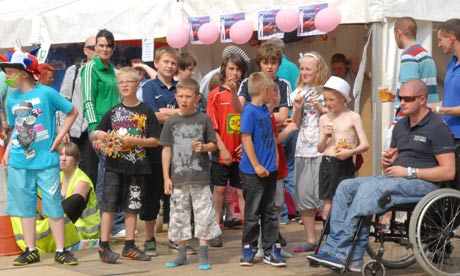
When Paul Belk took a break after the first year of a music degree at Newcastle University in 2005 to go backpacking in Asia, he was a fit, athletic 20-year-old. His ambition was to be a drummer and he played in a number of bands in his hometown of South Shields in Tyneside. However, within weeks of arriving in Thailand, Belk was in hospital in a coma with a prognosis of a 2% chance of living. It transpired that his drink had been spiked in a bar and, after slipping into unconsciousness, his brain had been starved of oxygen.
Three months later and back in the UK with his parents, Belk came out of the coma and, while his cognitive functions were intact, he needed to use a wheelchair and moved into Chase Park rehabilitation centre, in Gateshead.
He says he hopes to recover enough movement in his legs to eventually get back to playing the drums (his right foot doesn't have the mobility to operate a drum pedal), but, in the meantime, Belk has thrown himself into a role he had never anticipated – a "wholly accessible" music festival promoter.
With the summer season of music festivals already in full swing, Belk is committed to putting accessibility on the agenda, starting with making Chase Park festival, the event he helped establish, become a flagship.
"I have always been passionate about music. It was a combination of the help I got at Chase Park and my own determination that made the festival [happen]," he says.
By tapping into contacts he had in the music scene across the north-east of England, developing relationships with local charities, and forging links with groups campaigning for greater access to mainstream festivals, Belk found a vocation he could channel his energies into.
Problems at most music festivals include accessibility to stage areas when, for example, poor weather creates muddy conditions that make it difficult to use a wheelchair.
At Chase Park, Whickham, which held its inaugural free one-day festival last year, special raised trackways are used. This allows people to get to the stage area whatever the weather. In addition, there is a drop-off point that aids access to the stage and to specialised mobility equipment should it be needed.
More than 1,500 festivalgoers attended Chase Park in 2011. So far, Belk says, over 2,500 tickets have been distributed for this year's event, which takes place on 11 August.
"We had a lot of help planning and organising [last year]," Belk says. "Friends helped us with practical arrangements like dealing with local authority rules and regulations. Money was an issue [so] people gave their time for nothing. This year we have Arts Council funding. The calibre of bands we have attracted is incredible," he says. In addition to the bands, there are craft stalls, a circus workshop for children, and professional DJs giving classes.
Belk says it is crucial the festival is "for the whole community and it gives us an opportunity to increase wider understanding around accessibility issues". He insists that the last thing he ever expected was to become a campaigner, but that finding a way to combine his love of music with accessibility has been "inspiring".
So what are Belk's future goals? First and foremost is the plan to concentrate on his ongoing rehabilitation, but when it comes to music it is about "making Chase Park bigger and better" and trying to keep it free to the public.
"There's nothing else like this out there," he says. Beyond Chase Park, Belk believes more could be done to make mainstream festivals accessible.
He acknowledges that there is clear evidence of efforts being made by mainstream events organisers, including those that provide disabled campsites that have their own entrances. But, he says, it remains a challenge to introduce widespread changes at non-disabled events.
"A lot has been done already but there could be more; for example to help people with complex disabilities," says Belk. "I'm hoping Chase Park will show them what the gold standard should be."

